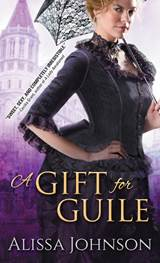by Alissa Johnson
She's a liar.
She's a con.
She's a thief.
And God help him, but he'll do anything to keep her safe.
Beautiful and conniving, maddening and brilliant, Esther is everything private detective Samuel Brass shouldn't want. Esther knows she's put herself in terrible danger, but nothing will stop her from making amends—not her family's enemies, not old fears, and certainly not the domineering, interfering, and undeniably handsome former officer of the Scotland Yard. Yet whenever he's near, Samuel makes her long for a life that can never be hers…and wish she were worthy of being saved.
Second in an exciting late Victorian romance series from a RITA Award nominee!
*^*^*^*^*^*^*^*^*^*^*
Fun Fact about the Victorian Age
Two of today’s most common Christmas traditions first gained
widespread popularity in the Victorian era. Christmas trees as we know them
today originated in Germany. It was Queen Victoria and her family who brought
the practice to England (and slightly later, America) in the mid 19th
century. So when you find your carpet covered with tinsel and dead pine needles
at the end of every year, you know who to blame. We can also thank the
Victorians for inventing the commercially printed Christmas Card. The first
were commissioned by Sir Henry Cole and designed by renowned illustrator John
Calcott Horsley in 1843. Sold for a shilling a piece, they quickly replaced
hand written Christmas greetings.
Excerpt:
Samuel grabbed Esther and shoved
her behind him just as the gig raced by, launching a great wall of ditch water
over the curb and onto him.
It soaked him through to the skin,
and there was nothing he could do but drag a hand down his face and flick the
excess moisture from his fingers.
Esther snickered. Actually, she
coughed, but it was a hide-the-snicker sort of cough. It didn’t fool anyone.
He glowered at her.
She snickered again.
“Get in the carriage, Esther.”
For once, she complied without
argument. She clambered inside, one hand covering her mouth. The moment the
door was closed, her laughter filled the carriage.
“Oh. Oh, Lord.” She flipped up her
veil. “I’m sorry. I’m terribly sorry. But the state of you. Good heavens.” She calmed herself a bit and reached
over to pat his knee. “My hero.”
Then she laughed some more.
He ought to be offended, really.
Annoyed at the very least. But he couldn’t seem to move beyond amazed.
He’d never heard her laugh before.
Not like this. Not with her head tipped back and the sound just flowing from
her.
Samuel wracked his brain for a
single memory of Esther laughing, really
laughing, and came up blank. Years ago, when she’d been little more than a
girl, she had giggled. Once or twice, she may have chuckled. Certainly, he’d
heard her snicker. But he hadn’t heard her laugh. Not as a child, and not since
he’d known her as an adult.
The woman simply didn’t laugh in
front of him.
It seemed an odd thing not to have
noticed before now. Stranger still that he should find an ordinary sound so
extraordinarily appealing. There was a sweet, clear tone to it that made him
think of wind chimes. Not the tinny sort Mrs. Lanchor had hung in the garden
two years ago (and the beast had mauled into oblivion three days ago) but the
solid sort that put one to mind of woodwinds.
Her laugh reminded him of wind
chimes that reminded him of woodwinds. By God, he was England’s finest poet.
“You’ve changed,” he murmured.
There used to be a brittleness about her, a deep unhappiness she kept hidden
away along with her kindness and honesty, all buried beneath a layer of cool
indifference. He couldn’t see that brittleness anymore.
“Beg your pardon?” Her laugh
tapered off slowly, and she looked at him uncertainly. “I didn’t mean to cause
offense.” A spark of mischievousness lit in her blue eyes. “Well, maybe a
little offense, but—”
“I’m not offended… Maybe a little
offended,” he corrected with humor. “But I wasn’t implying that you’ve changed
for the worse. It’s for the better.”
“Oh.” Her lips curved in a small,
hesitant smile. “Thank you.”
“You’re happier, aren’t you?”
“I am,” she agreed, and so readily
that he could only assume she’d given the matter some thought recently. “I am
starting to be.”
“It is nice to see.” It was more
than nice. It was something else, something more.
Here, he thought, was the woman
he’d caught glimpses of before. The remarkable one who amazed and fascinated
him. Only it wasn’t just a glimpse. He remembered her insistence that he wasn’t
a hard man and her defense of the little boy. And he wondered now if the traits
he admired in her had never been quite as buried or transient as he imagined.
Anything could seem like a glimpse, he realized, if one looked away too
quickly.
*^*^*^*^*^*^*^*^*^*^*
Giveaway:
3 copies of A Talent for Trickery

This looks like such fun! Thanks for the giveaway.
ReplyDelete